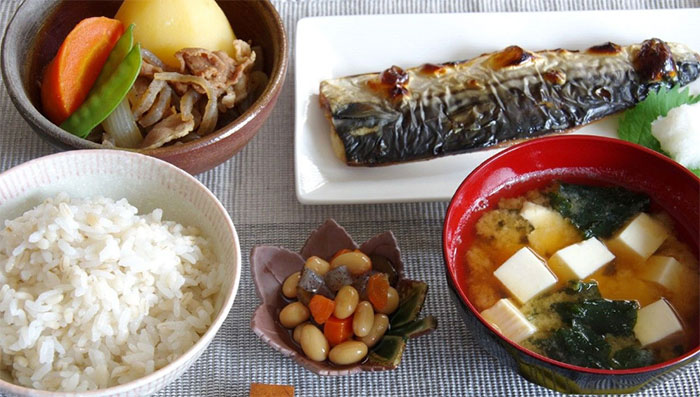The diet ranked No. 1 helps extend life expectancy
Over the past few decades, various diets have attracted the attention of the community. All of them promise to bring about positive changes in life. Most of these diets focus on helping you lose weight. However, some of these diets can help extend your life and help you stay healthy as long as you can persevere.
According to some health experts, you can start with a Mediterranean diet. However, recent studies show that to prolong life, the Japanese diet can bring new things.
Most diets focus on helping you lose weight. However, the ultimate ultimate goal is still to increase your life expectancy. In fact, it is actually designed to be a healthy diet.

The Japanese diet helps to lose weight and prolong life.
More and more studies are now showing that this can be achieved by trying Eastern diets, such as Japanese.
Less sugar and fat
Sugar and fat are the main factors in the development of many health-threatening diseases. The Japanese diet consists mainly of noodles, white rice, fish, seaweed, tofu, natto (fermented soybeans, traditional Japanese food) and fresh or pickled fruits and vegetables. Contrary to Western unhealthy eating habits, this diet can sometimes contain modest amounts of meat, milk or eggs.
According to Medical Daily , because of these food choices, the Japanese diet has also been shown to aid weight loss and help increase life expectancy. This is partly due to tradition.
The Japanese diet is smaller in size, rich in fruits and vegetables. In addition, these foods are low in fat and sugar. All of these factors lead to low calorie intake, which can help you lose weight.
Sugar helps bring out the sweetness, making food more delicious. In addition, sugar is a type of energy food, used as a seasoning spice, and 1 g of sugar provides 4 kcal. When ingested, sugar is quickly converted into energy for the body.
However, using too much sugar causes overweight and obesity, increasing the risk of non-communicable diseases. According to the World Health Organization's recommendation, the amount of free sugar (simple, double sugar) consumed in a day does not exceed 10% of the energy intake (ideally less than 5%). This means less than 25 - 50 g of free sugar per day for adults and less than 12 - 25 g of sugar per day for children.
If you must use sugar in processing, it is best to use sand / brown sugar, honey ., not refined sugar. In the composition of refined sugar contains more sugar content and provides higher energy.
- 5 principles of healthy eating for everyone in Japan can apply
- Traditional Japanese food helps to live long
- Vietnamese people live the 56th life in the world
- The secret of the relationship between names and life expectancy
- Detecting genes increases the life expectancy by 30%
- Can people extend life expectancy in the future?
- Diet helps to maintain the 'spring age' of the brain
- The average life expectancy of Japanese people reaches a new record: More than 87 for women and 81 for men
- Find a drug that extends your mouse's life expectancy by 35%, coming soon for humans?
- Litium helps increase life expectancy
- Is the life expectancy of human beings reaching the limit?
- Harvard expert: easy walking way to reduce 41% risk of premature death
- Whoever has the highest and lowest life expectancy in the world
- How to extend your life at work
 Green tea cleans teeth better than mouthwash?
Green tea cleans teeth better than mouthwash? Death kiss: This is why you should not let anyone kiss your baby's lips
Death kiss: This is why you should not let anyone kiss your baby's lips What is salmonellosis?
What is salmonellosis? Caution should be exercised when using aloe vera through eating and drinking
Caution should be exercised when using aloe vera through eating and drinking Vegetables are good but some have a surprisingly high glycemic index. Eating too much will cause blood sugar to spike!
Vegetables are good but some have a surprisingly high glycemic index. Eating too much will cause blood sugar to spike!  Does braised pork and fish meat and fish cause cancer?
Does braised pork and fish meat and fish cause cancer?  People who should not eat banh troi are vegetarian
People who should not eat banh troi are vegetarian  Why does eating a lot of sweets make you age quickly?
Why does eating a lot of sweets make you age quickly?  Benefits of plums for people with diabetes
Benefits of plums for people with diabetes  Just 2 minutes of walking after a meal also helps prevent diabetes
Just 2 minutes of walking after a meal also helps prevent diabetes 